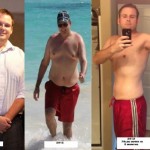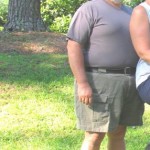
Meal Frequency 19 Comments Thursday, July 18th, 2013 Written by: Kevin Cann Many nutritionists, dieticians, and doctors have advised clients to eat more frequently throughout the day. The idea behind this eating schedule is it better controls blood sugar, which in turn controls cravings and hunger. By controlling cravings and hunger, the thought is the individual will consume less food and ultimately less “junk” food. The logic makes sense, but I do not feel the science is there to back it up. On the contrary, people partaking in intermittent fasting (IF) and raving about it is on the rise, and this may be a dangerous undertaking. From an evolutionary standpoint, when did we begin to consume set meals? Throughout history our meal times were variable. Our paleolithic ancestors were not sitting down at 8am, 12pm, and 5pm for their daily meals. Due to this the human body has developed a means to go an extended amount of time without food and survive. We can go weeks without food through a process known as gluconeogenesis. Gluconeogenesis is a catabolic process initiated by cortisol. Our tissues in our body are carried to the liver and broken down into their amino acids to be converted into glucose. This is a great phenomenon to survive a famine, but not so great for sustainable weight loss. In fact gluconeogenesis induces insulin resistance and may be why stress is associated with the symptoms of metabolic syndrome (http://www.ncbi.nlm.nih.gov/pubmed/11724664). This is where intermittent fasting (IF) may become an issue. IF seems to be the next big thing that will solve the world’s weight issues. For some it may be beneficial to health. The research is promising when we look at neurodegeneration. IF may signal certain cellular pathways that protect the neurons from oxidative damage (http://www.ncbi.nlm.nih.gov/pubmed/16899414 ). However, for those of us just looking to maximize health it may not be the best choice. Confining meals to 8 hours a day can lead to undereating. This will initiate gluconeogenesis as well as downregulate our thyroid (http://www.ncbi.nlm.nih.gov/pubmed/2341229). This can lead to decreased mood and the inability to lose weight. Remember that cortisol is our major stress hormone. Eating too few calories is a stressor, and so are any nutrient deficiencies. Leptin levels will fall increasing hunger while cortisol is increasing insulin resistance. This is a very good way to create an environment where you overeat and store a lot of fat. On the other end of the spectrum, IF may pose a means to be beneficial to both health and weight loss if we are not in a state of stress or trying to maximize performance. This means we are getting 8-10 hours of uninterrupted sleep per night, do not suffer from chronic stress, are taking in enough calories, have no nutrient deficiencies, and we are not trying to compete in a sport. Studies have shown IF to be an effective means for weight loss, and it may even have a protective effect on our heart (http://www.nutritionj.com/content/11/1/98). Adrenaline is a neurotransmitter that is released during times of stress. It helps us cope with physical and emotional pain. Just like with insulin and leptin, our cells can become resistant to adrenaline. This is really bad if fat loss is your goal because adrenaline is responsible for releasing our stored fat into the bloodstream to be used as energy. Insulin, leptin, and adrenaline are key players to energy homeostasis. If there is resistance in one there is resistance in all three. This sets the stage to be very good at storing fat and very poor at releasing that stored fat. This is one way in which we can continue to cut calories and continue to gain weight! If we are resistant to any one of these hormones, IF is a bad idea. Exercise can both help and hurt us here. The right amount of physical activity can increase sensitivity to insulin in both the muscles and the liver. However, too much exercise can just piggyback on the same issues with leptin, insulin, and adrenaline. 6 meals per day will definitely allow for glucose to be readily available at all times. This will prevent us from using gluconeogenesis to maintain blood sugar. However, there are some other issues with this eating frequency. There are two phases for insulin secretion. The first phase lasts for approximately 10 minutes. The pancreas stores insulin in preparation for the next meal. During phase 1 this stored insulin is released. In phase 2 the pancreas produces more insulin. Insulin is present in the bloodstream for 2-3 hours after the meal is consumed. Eating every 2-3 hours puts a strain on the pancreas because it is unable to produce the stored insulin for phase 1 of secretion. This means that our pancreatic beta cells are working nonstop. This is a fast track to type 2 diabetes. In fact, loss of first phase insulin secretion is an independent predictor of type 2 diabetes (http://www.ncbi.nlm.nih.gov/pubmed/22834840). Leptin and insulin work together to control energy consumption and storage. There are leptin receptors present on the pancreatic beta cells. As we eat, leptin levels should rise, increasing satiety as well as communicating with the pancreatic cells to stop producing insulin (http://www.ncbi.nlm.nih.gov/pubmed/14749281). On the other hand, an increase in insulin increases leptin. If we continually secrete insulin, increasing leptin, we can be on a fast track to leptin resistance and metabolic syndrome. Once again we have developed leptin and insulin resistance. Our body, when functioning properly, has a checks and balances system. Opposite insulin is a hormone called glucagon. Glucagon communicates with the liver to release its stored glucose to maintain blood sugar levels. At this point free fatty acids are stimulated, as well as ketone bodies. This is the true fat burning time. Insulin and glucagon cannot be present in the bloodstream at the same time, so this occurs roughly 3 hours after eating a meal. If we consume a meal every 2-3 hours glucagon is never released and we never enter this fat burning period. We cannot burn fat while insulin is present! Eating throughout the day causes our pancreas to become exhausted and our liver to become lazy. We need to create a balance of work and rest between the two. Not releasing stored glucose from the liver is bad news, especially if we are inactive. If those liver stores are full, the carbohydrates will be converted to triglycerides and sent to storage. If you feel fatigued and moody every 2-3 hours if you do not eat, then this is a sign of insulin resistance. Your energy and mood are being driven by blood sugar swings. Your pancreas is constantly releasing insulin, and any leftover insulin in the blood will spike hunger and dip energy. Remember high insulin equals high leptin. The snack may alleviate the symptoms temporarily, but done over the long haul it will lead to insulin and leptin resistance. Eating 3 meals a day seems to be an effective way to avoid the stressors of undereating or going too long without food while allowing for our fat burning hormones to do their job. I would encourage these meals to be spaced apart every 5 hours. This allows for equal time between insulin and glucagon and an equal work to rest ratio for our liver and pancreas. If hunger persists try eating more at the previous meal, especially protein, or try taking some digestive enzymes with each meal. People who partake in IF rave about its ability to stimulate fat loss, and show some studies to support this. I personally believe 16 hours between two meals is too long. You can have the same weight loss effects spacing out dinner from the night before and breakfast 10-12 hours. This decreases the risk of causing excess stress and allows for substantial time in the fat loss area. I hope this helps clear up why I recommend 3 meals per day for resetting hormones and stimulating fat loss. Snacking does the same thing as a full meal in terms of insulin secretion and shutting off the fat burning hormones. If you are diabetic it is important to talk to your doctor about meal frequency because it may be important to eat more frequently to maintain blood sugar. Also, eating more frequently throughout the day may be beneficial to athletes. This can ensure the glycogen stores are full and ready to go, as well as ensure that the athlete is taking in enough calories. Eating for performance differs from eating for maximal weight loss and health. In conclusion, the first step to undertake to obtain optimal health is to try the paleo template along with getting 8-10 hours of uninterrupted sleep, and undertaking some stress management techniques. Health and disease are along a spectrum, the more you do to obtain better health the better chances of reaching your goals. Remove grains, dairy, and legumes for a month or two and reassess your health. Eating 3 meals a day may be really hard to do right off the bat. Just removing problematic foods can go a long way to making you feel better. After this time period has elapsed and you feel you have stalled, try switching it up to eating 3 meals per day spaced roughly 5 hours apart. If after a few months you are feeling great, sleep is great, but you still think you may be able to lose more fat perhaps then you try IF. About Kevin Cann Kevin is owner of Genetic Potential Nutrition. He is a holistic nutritionist, wellness coach, and strength coach.
Originally from:
Meal Frequency – Robb Wolf











 For now classes are 6pm and 640pm at 2840 Wildwood st in the Boise Cloggers studio.
Book your class NOW!
click this ==>
For now classes are 6pm and 640pm at 2840 Wildwood st in the Boise Cloggers studio.
Book your class NOW!
click this ==>








